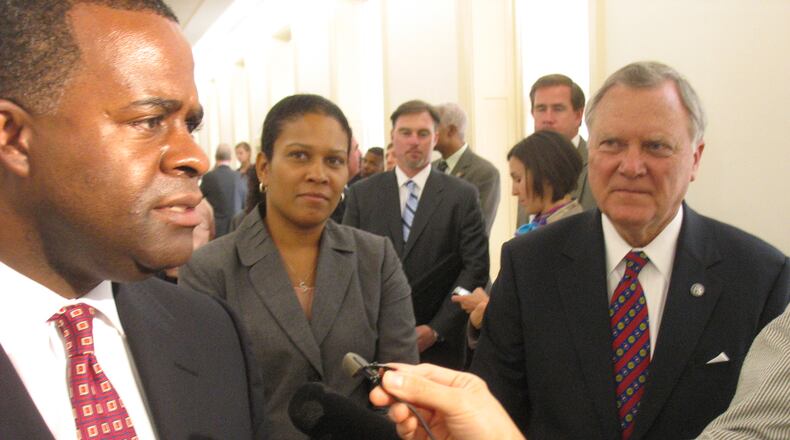Gov. Nathan Deal and Atlanta Mayor Kasim Reed have struck a famous bipartisanship friendship that extends to shared policies on transportation issues and economic development debates. But a divide has opened between the two on the topic of whether Georgia should be open to Syrian refugees.
You'll recall that Deal, a Republican, said Monday he opposes federal efforts to relocate Syrian refugees in Georgia, and he signed an executive order that instructs state agencies to halt any efforts to resettle them.
Reed, when interviewed Monday, said that he believes the federal government's vetting of the 10,000 Syrian refugees the Obama administration plans to resettle in the U.S. needed to be "significantly enhanced and changed" and said "we cannot proceed status quo."
When he talked to our AJC colleague Katie Leslie on Tuesday, his disagreement with Deal sharpened. The Democrat told Leslie that state leaders should not "completely close access" to Georgia from Syrians fleeing their war-torn country.
...
The mayor sought to downplay the importance of the policy disagreement several times, noting: "My approach is different from the governor's, but that's not uncommon. Politics isn't about being in lock step. It's about putting forward your view of how things should happen. I was asked a question and I gave an honest answer."
Asked what he'd say to Muslims, particularly in Georgia, who fear being targeted for acts of violence in response to the Islamic State-led Paris attacks, Reed said Atlanta remains a "welcoming city."
"I do not tie events to a faith. I tie events to horrible people who are soulless and engaging in awful acts," Reed said. "They need to be dealt with in the most severe fashion that you can deal with them. I believe they are terrorists."
The state's opposition may not amount to much of an obstacle to the federal government. Even Deal acknowledged in an interview that the federal government can work around the roadblocks his administration set up to add to the 59 Syrian refugees in Georgia.
"We have simply instructed all of our state agencies not to process any paperwork or anything related to that," said Deal. "It is possible that the federal government can work through their placement agencies to send refugees to a state even when a state doesn't approve of it."
But it highlights the larger debate about funding the program that will likely rage in Congress for the next few weeks as Washington lurches toward a Dec. 11 government shutdown deadline.
Update 2:55 p.m.: Meanwhile in Washington, Rep. John Lewis, D-Atlanta, also said Deal has it wrong. As he told us this afternoon:
"As the pope stated when he spoke to a joint session of the Congress, we are all immigrants. We all come from some other part. And I don't think it's the role of governors, like the governor of Georgia and some other states are saying that they don't want people coming. It's the role of the federal government and not the role of governors to say who can and cannot come. I think we have the capacity to monitor, to vet people before they come in."
Lewis added that he was not concerned about shortcomings in the refugee vetting process and does not think Congress should halt it:
"If there's any weakness or holes in it, I think, can be fixed, to do it. ... No, the system is not broken. It operated well all these many years."
But fellow Atlanta Democratic Rep. David Scott disagreed in a statement:
"My first duty is the security of the United States. We do not have a mechanism to vet the 10,000 Syrian refugees headed to the US. Until we can verify who is coming to our country, we should halt the influx of refugees. We won't solve the refugee problem until ISIS is defeated."
About the Author
The Latest
Featured




